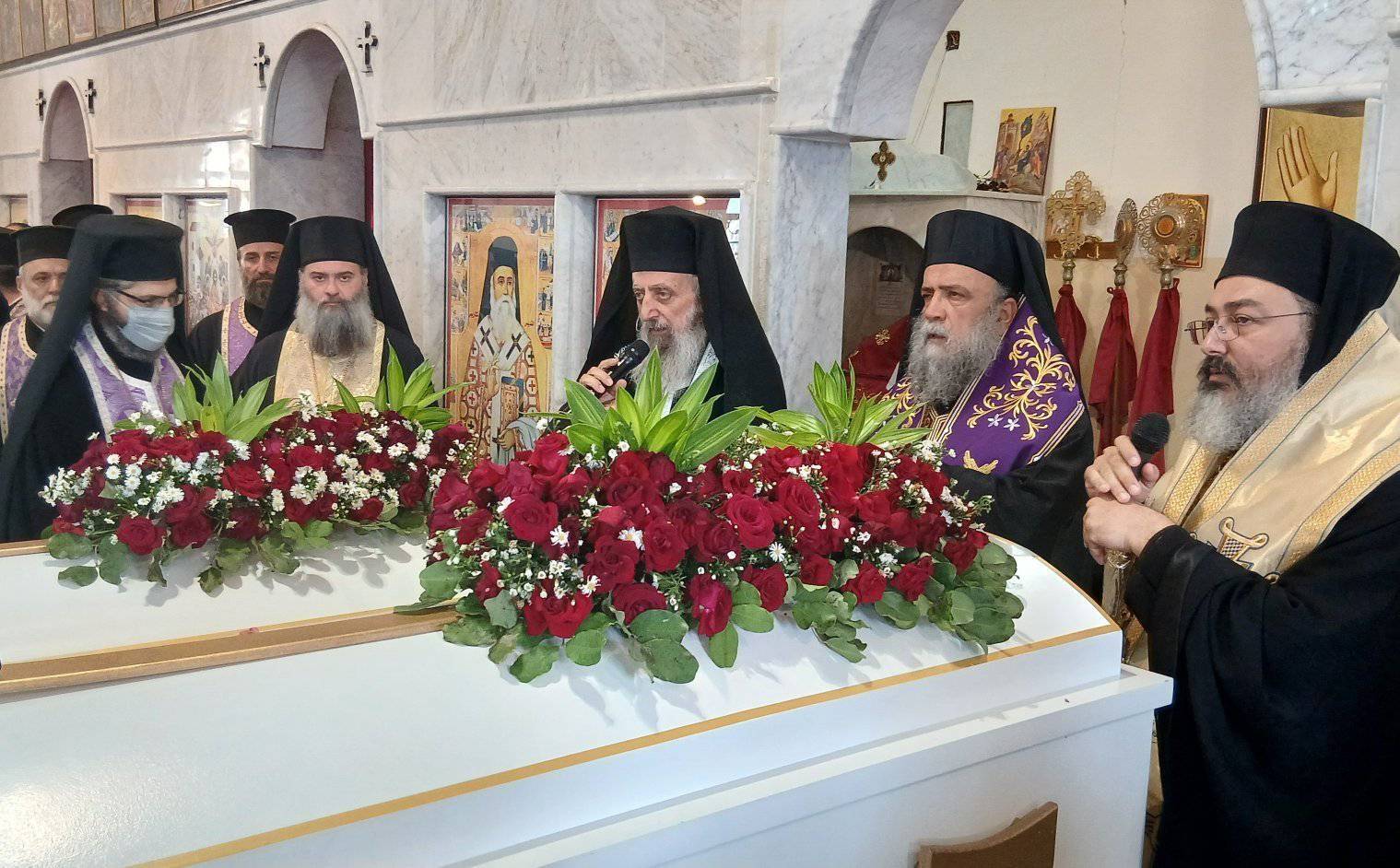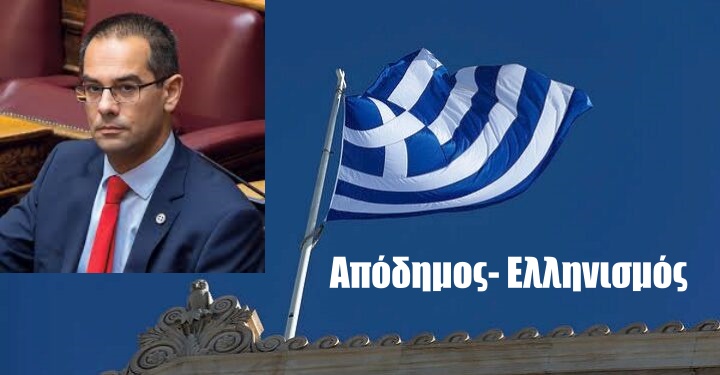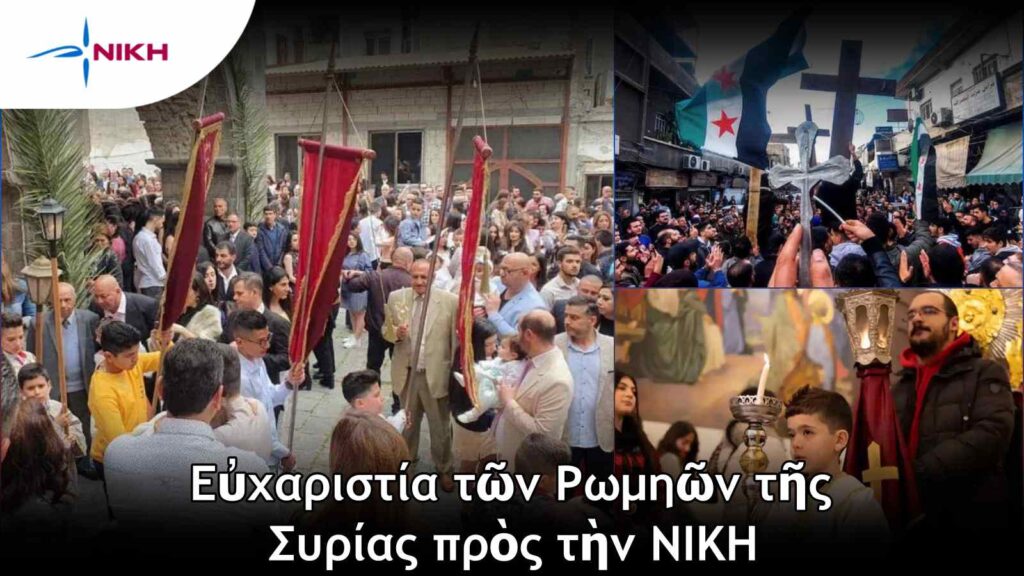Ten Timely Questions and Answers on NIKI’s Positions Regarding Romeosyne
Question 1
Why does NIKI insist on using the terms Romeos and Romanía? Isn’t that a historical anachronism?
Answer
It is certainly not an anachronism. Romeos and Romanía are the names under which our people lived and flourished for more than fifteen hundred years. The term Byzantium was introduced deceitfully and only prevailed during the last two centuries. Beyond restoring historical truth and the continuity of our people (Genos), their use highlights our historical rights and opens channels of communication with related communities in the Middle East and across the world. Memory is not a burden; it is an advantage for the future.
Question 2
Do you want to impose a “religious” and therefore “medieval” identity on the modern Greek state?
Answer
Neither is a religious identity imposed, nor is there any return to the “Middle Ages.” The charge that “you impose a religious—and therefore medieval—identity” is false. The modern Greek state must be democratic, a state of law, with full respect for freedom of conscience for all—believers, atheists, and those of other faiths. Romeosyne does not impose religion; it brings forth historical continuity. What is “medieval” is not memory, but ignorance of who you are. Politics needs roots, not blinders; our tradition functions as a signpost of historical and moral orientation, as a foundation and a prerequisite for social cohesion.
Question 3
How will the country benefit if we speak today of Romeosyne rather than simply of Hellenism?
Answer
Romeosyne does not replace Hellenism; it expands it. It provides three key additional advantages: First, it highlights the continuity of our identity and thus brings to the fore many forgotten historical rights. Second, it enables communication with related communities in the Middle East and around the world. And third, it strengthens social cohesion—on the one hand, by emphasizing strong communal values such as solidarity, care for the weak, accountability, and so forth; and on the other hand, by offering us a powerful historical and existential sense of meaning with eschatological perspectives.
Question 4
Doesn’t the emphasis on Romeosyne divide rather than unite, since some people do not identify with it?
Answer
No, of course it does not divide. Romeosyne is indeed our historical identity and our common cultural heritage, but it is not a label imposed on all. NIKI proposes a shared framework of memory and values that allows pluralism and dialogue. Yet every individual freely defines himself; the State remains neutral, while we simply bring forward what unites us: language, history, values, culture. We do not ask anyone to change their self-identification; on the contrary, we affirm that the State is democratic and neutral.
Question 5
You propose granting “Expatriate Status” (“Status of Homogeneis”) to the Romeoi of the Middle East. Isn’t that dangerous, opening the door to mass migrations?
Answer
Certainly not. First, we must clarify that “Expatriate Status” is not the same as citizenship. We are neither opening the gates to mass migrations nor “baptizing” everyone as Greeks. The proposed framework for recognizing the Romeoi of the Middle East as homogeneis (Greek diaspora members) includes clear safeguards: (a) granting based on precise criteria (ecclesiastical/community certificates, official documents, etc.), (b) granting residence/work permits, without any automatic pathway to citizenship, (c) multiple security checks (biometric, cross-verifications, etc.), and above all, (d) absolute emphasis on “staying there” (funding schools, scholarships, medical care, etc.) so that the communities may live securely on their ancestral soil.
Question 6
Why are you concerned with the Orthodox Romeoi of Syria? Isn’t that an internal matter of another State?
Answer
We neither intervene in nor substitute for another State. We simply support people who belong to our historical community, with full respect for sovereignty, local laws, and international law. Still more, no one even contemplates any form of security or military involvement. Yet practical support for our brothers is our absolute duty. Such support may include scholarships, medical aid, assistance to schools and communities, legal help for rights and freedoms, and so forth—always, of course, with the consent of the local authorities.
Question 7
Isn’t it dangerous to “involve yourselves” in religious matters in the Middle East?
Answer
There is no “involvement.” There is respect for State sovereignty and local laws, for international law, and for the freedom of religion of all, while we act with institutional neutrality. We always seek to ensure that our initiatives are not unilateral but in cooperation with European partners. Humanitarian and cultural actions—such as scholarships, medical assistance, support for schools and communities, or legal aid for rights and freedoms—cannot be considered involvement in religious matters. Nor can a visit by NIKI to the Patriarch of Antioch or to Romeike Communities be seen as interference in religious affairs.
Question 8
We all recently witnessed the massacre of Orthodox Romeoi in Damascus. What would NIKI do differently for the Romeoi of Syria that current governments are not doing?
Answer
Rhetorical condemnation is not enough. We, NIKI, as Government, would take far more substantial steps—steps which we propose even now to the Greek Government. First, we would appoint and organize a specialized unit within the Ministry of Foreign Affairs with a designated commissioner in charge of fully coordinating actions. This we consider decisive. Beyond that, much can be done, such as: (a) establishing a 24/7 Communication Center, (b) deploying a mobile consular team in Lebanon, (c) creating an Emergency Support Fund with contributions from citizens and institutions, (d) dispatching medical/social teams from the National Health System and volunteer bodies, (e) forming legal teams for support and documentation of hate crimes, (f) transferring the wounded, the sick, children, and their aides, (g) accelerating legislative initiatives to support our brothers (homogeneis status, etc.), (h) preparing plans for safe corridors of escape, including large-scale relocations and population reception, (i) raising these issues in international forums, and above all, (j) supporting and closely cooperating with the Patriarchate of Antioch.
Question 9
Doesn’t the reference to a “New Romanía” sound like utopia or an imperial project?
Answer
The “New Romanía” is our long-term vision as a Movement: starting from and centered on our homeland, we will regenerate the Romeiko and form a union of states—whether in the shape of a confederation or even a federation—comprising the successor states of historic Romanía. This is not about empire, but about reuniting the Orthodox forces of the world so that they may defend light, democracy, and the freedom of the person against the looming deep darkness. And it is certainly not utopia. How many of our saints have spoken about this very matter? It is something our tradition awaits, and, as anyone can see from world developments, it becomes ever more visible and distinct by the day. It is a guiding vision that inspires us in NIKI—a vision that continually directs our orientation, strengthens our historical identity, and gives luminous meaning to our entire personal and collective existence.
Question 10
How do you, in NIKI, respond to the accusation that you mix politics with the Church?
Answer
There is no mixing. We have simply stated that, as persons, we strive to be faithful to the imperatives of our Orthodoxy. Beyond that, we do not confuse State with Church. There is a clear distinction of roles: a neutral and democratic State, and freedom in matters of faith. Institutional neutrality, equal treatment of all citizens, and respect for freedom of conscience are firmly in place.
Romeosyne Section of NIKI
Head: Ioannis Kon. Neonakis
Notes: (a) The term “Romanía” (with an accent on the í to distinguish it from the modern state of Romania) is the correct designation for the Roman Empire after the transfer of its capital, instead of the erroneous and deliberately employed term “Byzantium”.
(b) For reasons of more accurate phonological rendering and simplification, the term “Romeoi” was preferred over “Rhomaioi”.
(c) The term “Romeosyne” was preferred over “Romanitas”, as it better expresses the culture of the Roman Empire after the prevalence of Christianity.
(d) romeike (adjective): of the Romeoi.
(e) Romeiko (noun): the romeike world, the romeike body.
Related posts
-
Gratitude from the Romeoi of Syria to NIKIRomeosyne 20 October 2025



